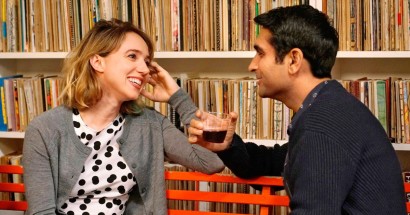The Big Sick: Loving Across the Divide
My column in yesterday’s New York Post celebrates cross-cultural love, taking inspiration from this summer’s hit film, “The Big Sick.” Based on a true story, the movie tells the tale of a Pakistani Muslim-American man, Kumail, and Emily, a white woman from the South, who meet and fall in love in Chicago.
Since reading “Summer of My German Soldier” at age 13 and “Romeo and Juliet” at 14 (and probably long before that), I’ve always been partial to stories about lovers from different worlds. Especially today, during a long, hot summer in which our country is deeply divided along political/cultural battle lines, it is uplifting to sit in a cool movie theater and watch a story about two young people who simply want to be in love, and be normal.
Maybe if there’s hope for two lovers to build a life across a cultural divide (and for their story to resonate broadly, as it clearly does, since the film is a hit), there’s still hope for some political leadership to emerge in our country that would begin to bridge our deep political and cultural divisions.
I recommend the film; it is honest and sweet. The characters face not one but at least three big obstacles – including the opposition of Nanjiani’s family, who want him to marry a Pakistani-Muslim woman, and Emily’s illness. But perhaps the biggest conflict is Nanjiani’s internal conflict over whether to confront his family with the truth. For much of the film, he compartmentalizes his life with Emily, keeping her entirely separate and secret from his family, whom he fears losing if they should find out about his love. This story has relevance for cross-cultural relationships and others in which people want to build a life and fall more deeply in love, but not to shift or alter their larger lives. It is a film about maintaining one’s family of origin relationships, while giving up old beliefs, as well as some vestiges of childhood, including the need to please one’s parents, in order to build a life with a partner. While I don’t think the film is phenomenal, I think it is quite good, and honest. In addition to being entertaining, it’s of value in bringing a badly needed realistic perspective to a dimension of life (romantic relationship-building) that gets over-romanticized and not honestly explored very often in film.
A few words about the acting: Nanjiani (who plays himself) is all right, but as Emily, Zoe Kazan, granddaughter of famed director Elia Kazan, is luminous. Her charmingly offbeat looks and her warbling, childlike voice are perfect for the film’s coming-of-age narrative (both main characters struggle not only to bridge a cultural divide but to break away from their families of origin and individuate).
If Hollywood and America can think and feel broadly and individualistically enough to embrace an offbeat beauty and uniqueness, Zoe Kazan will be an enormous star. Her charisma makes it difficult to watch anyone else when she is on screen.
Fans of “Everybody Loves Raymond” will be happy to see Ray Romano in the role of Emily’s father. As the slightly henpecked husband and father who may seem lackluster in the day to day, but who quietly, like so many fathers, remains solidly there for his family in rocky times, providing for them as best he can, with everyday, manly courage, he is close to perfection. He’s also pretty funny in the role. And very real.
This film reminded me of a line from the poem “Desiderata” – something I try to remember when life in the city starts to feel a bit much: “Be not cynical about love;/for in the face of all aridity and disenchantment/it is as perennial as the grass.”




